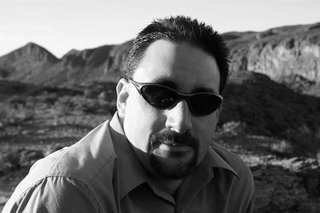Goode For Nothing
What makes the first amendment a remarkable piece of writing is that it protects anyone's right to pretty much say any damn thing they want, no matter how ignorant, prejudicial or just plain stupid.
That's a good thing for Virginia congressional representative, Virgil Goode (R), who in a recent letter to his constituents wrote, "The Muslim representative from Minnesota was elected by the voters of that district and if American citizens don't wake up and adopt the Virgil Goode position on immigration there will likely be many more Muslims elected to office and demanding the use of the Koran."
The representative in question is Keith Ellison who is Muslim and who has elected to take the oath of office on the Koran rather than the Bible. In an interview with Fox News, Goode defended his letter saying, "I wish more people would take a stand and stand up for the principles on which this country was founded." He went on to say that he would like to do away with visas that let in people, "not from European countries."
I'm not sure what I find more disturbing; Mr. Goode's sentiments, his unbelievable ignorance about the founding of his own country, or the fact that his constituents re-elected him just a little over a month ago. I am sure of this, however:
As both an elected official and as a Virginian, Mr. Goode should be ashamed.
For it was his fellow Virginians James Madison and Thomas Jefferson who wrote much of the language that shaped the United States. Their words formed the bedrock values of a fledging nation; language that guarantees free speech, protects the right to dissent from the majority view, and to worship or not to worship as one sees fit. These men well understood the importance that a government has allegiance to no religious viewpoint, and moreover, that it not impose a religious point of view on its citizens.
Representative Goode would do well to bone up on the Declaration of Independence and the Bill of Rights, before the 110th Congress convenes, in order to better acquaint himself with the principles upon which he attempts to create law.
That's a good thing for Virginia congressional representative, Virgil Goode (R), who in a recent letter to his constituents wrote, "The Muslim representative from Minnesota was elected by the voters of that district and if American citizens don't wake up and adopt the Virgil Goode position on immigration there will likely be many more Muslims elected to office and demanding the use of the Koran."
The representative in question is Keith Ellison who is Muslim and who has elected to take the oath of office on the Koran rather than the Bible. In an interview with Fox News, Goode defended his letter saying, "I wish more people would take a stand and stand up for the principles on which this country was founded." He went on to say that he would like to do away with visas that let in people, "not from European countries."
I'm not sure what I find more disturbing; Mr. Goode's sentiments, his unbelievable ignorance about the founding of his own country, or the fact that his constituents re-elected him just a little over a month ago. I am sure of this, however:
As both an elected official and as a Virginian, Mr. Goode should be ashamed.
For it was his fellow Virginians James Madison and Thomas Jefferson who wrote much of the language that shaped the United States. Their words formed the bedrock values of a fledging nation; language that guarantees free speech, protects the right to dissent from the majority view, and to worship or not to worship as one sees fit. These men well understood the importance that a government has allegiance to no religious viewpoint, and moreover, that it not impose a religious point of view on its citizens.
Representative Goode would do well to bone up on the Declaration of Independence and the Bill of Rights, before the 110th Congress convenes, in order to better acquaint himself with the principles upon which he attempts to create law.


0 Comments:
Post a Comment
<< Home